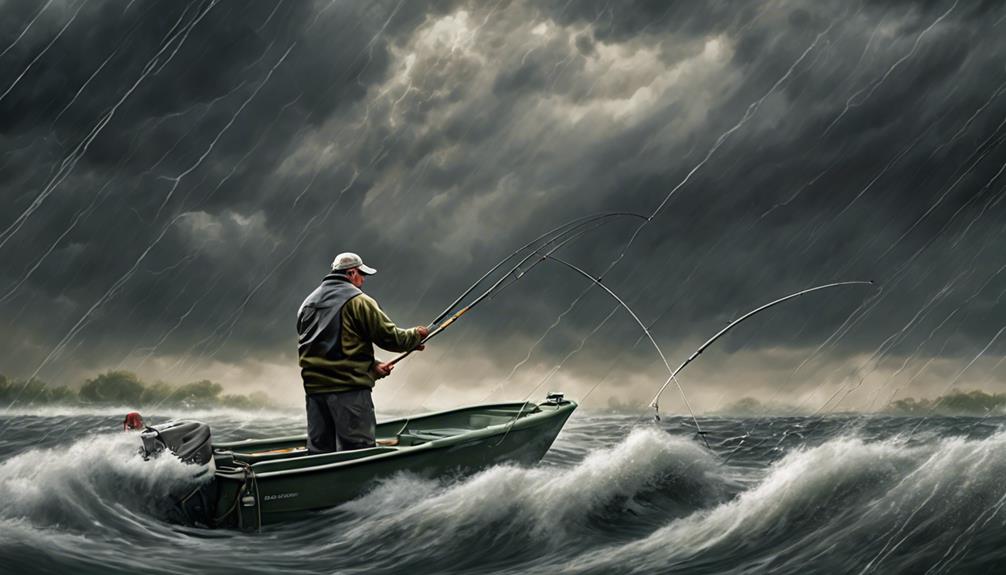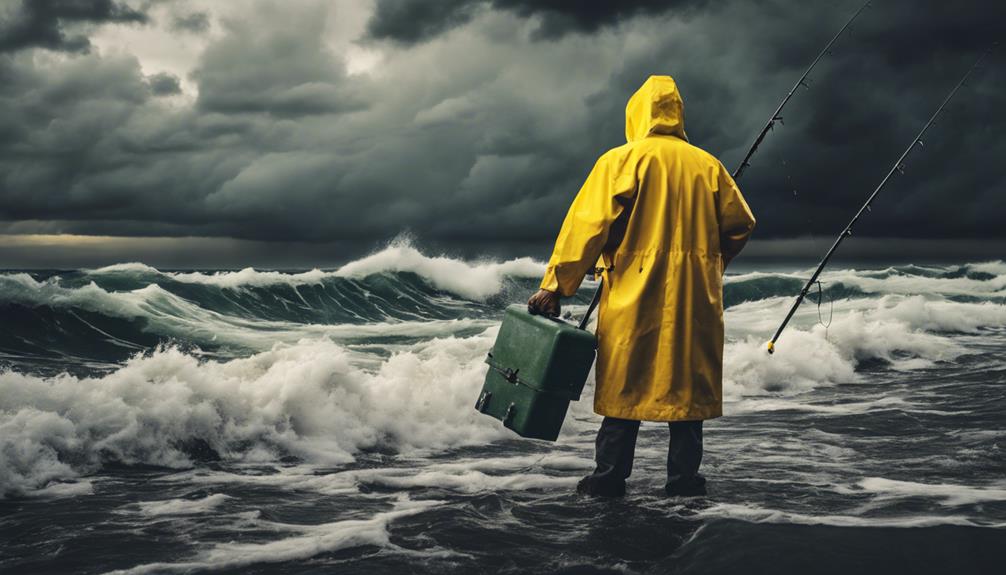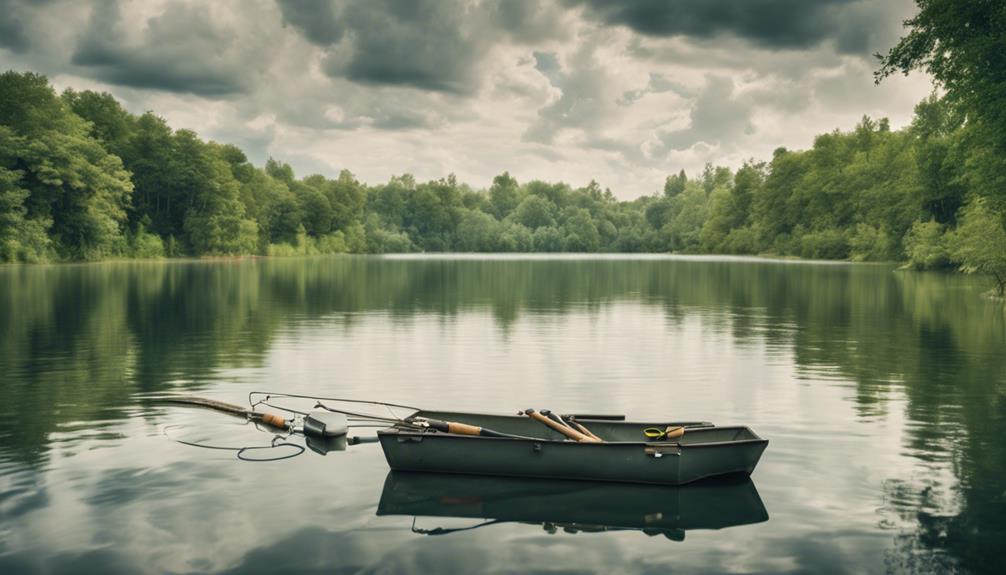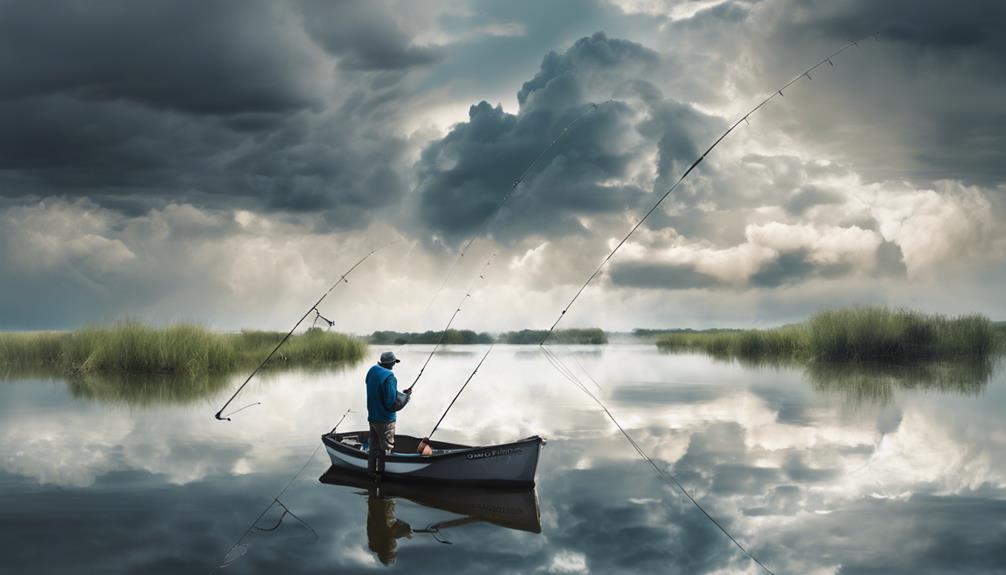Prepare for fishing in challenging weather conditions by checking accurate forecasts from reliable sources. Pay attention to details like wind speed and precipitation levels, and have contingency plans ready. Pack essential rain gear like waterproof clothing, umbrellas, and dry bags to keep belongings safe. Choose bait based on fish species and weather conditions, using natural baits or artificial lures strategically. Secure fishing equipment by maintaining it, organizing tackle, and waterproofing gear. Prioritize safety with PFDs, emergency procedures, and communication plans. Adapt fishing techniques for success in unfavorable weather. Plan ahead for emergencies with detailed steps and necessary communication devices. Mastering these strategies ensures a safe and rewarding fishing experience.
Checking Weather Forecast
Before heading out for fishing in unfavorable weather, it's crucial to carefully check the weather forecast to ensure your safety and preparedness. Weather preparation plays a vital role in ensuring a successful fishing trip. By assessing the forecast, you can anticipate any potential risks or challenges that may arise during your excursion and develop appropriate emergency response plans.
The accuracy of the weather forecast is paramount when planning for adverse conditions. Reliable sources of weather information should be consulted to gauge the likelihood of inclement weather. Pay close attention to details such as wind speed, precipitation levels, and storm predictions. Understanding these factors will enable you to make informed decisions about whether it's safe to proceed with your fishing trip or if adjustments need to be made.
In the event of an unexpected shift in weather conditions, having contingency plans in place is essential. Consider alternative fishing locations that offer shelter from harsh weather or have quick access to safety zones. Additionally, ensure that you have the necessary emergency response equipment on hand, such as communication devices, first aid kits, and emergency blankets. Being prepared for sudden changes in the weather can make a significant difference in your overall safety and enjoyment while fishing.
Packing Essential Rain Gear
Ensure your fishing gear includes essential rain gear to protect yourself from adverse weather conditions during your excursion. Waterproof clothing is a must-have item to keep you dry and comfortable when fishing in the rain. Look for breathable materials that offer both water resistance and ventilation to prevent overheating. A good quality waterproof jacket and pants will shield you from the elements and maintain your body temperature.
Additionally, carrying an umbrella can provide extra protection, especially when you need to remain stationary for a while.
To keep your belongings safe and dry, invest in dry bags. These waterproof bags come in various sizes and are perfect for storing electronics, food, and extra clothing. They're lightweight, compact, and essential for any fishing trip in wet conditions.
Ponchos are another practical option to consider. They're easy to pack, quick to put on, and offer full-body coverage during heavy downpours. Ponchos are versatile and can be worn over your regular fishing attire without restricting movement.
Choosing the Right Bait
When selecting the right bait for your fishing expedition, consider the specific fish species you're targeting and the prevailing weather conditions. Bait selection plays a crucial role in enticing fish to bite, and understanding fish behavior is essential to make the right choice. Additionally, bait presentation is key, especially in challenging water conditions.
- Natural Baits: Utilize live bait such as worms, minnows, or shrimp to mimic the natural food source of the fish you're targeting. Live bait can be highly effective in attracting fish due to its movement and scent, making it an excellent choice for species like bass or trout.
- Artificial Lures: Artificial lures come in various shapes, sizes, and colors, offering versatility in different weather conditions. Choose lures that imitate the movements of prey fish or insects to trigger a predatory response from your target species. When using artificial lures, consider factors such as water clarity and the activity level of the fish.
- Fly Fishing Flies: Fly fishing flies are ideal for targeting specific fish species that feed on insects or smaller prey. Match the fly pattern to the insects present in the area and adjust your presentation to mimic natural movements. Fly fishing requires skill and finesse, but it can be incredibly rewarding when done correctly, especially in adverse weather conditions.
Securing Fishing Equipment
Securing fishing equipment properly is essential to ensure a successful and safe fishing experience. Equipment maintenance is crucial to prevent malfunctions that could ruin your trip. Before heading out, check all your gear for any signs of damage or wear. Replace worn-out lines, hooks, or reels to avoid disappointments when you're out on the water. Additionally, ensure that your rods are in good condition and that the reel mechanisms are functioning smoothly.
Storage solutions play a vital role in keeping your equipment organized and easily accessible. Invest in a tackle box or bag to keep all your lures, hooks, and sinkers in one place. This won't only save you time but also prevent you from losing small items that are essential for your fishing success. Consider using compartmentalized storage containers to keep everything neat and tidy.
To protect your gear from water damage, waterproofing is essential. Use waterproof bags or containers to store electronics such as your phone, GPS device, or camera. For your tackle box, opt for one that has a secure seal to prevent water from seeping in. Additionally, consider using waterproof cases for your fishing license and other important documents.
Tackle organization is key to efficient fishing. Sort your tackle by type and size so you can quickly find what you need when changing baits or lures. Utilize small containers or dividers within your tackle box to keep everything sorted and easily accessible. By maintaining and organizing your fishing equipment, you'll be better prepared to face unfavorable weather conditions and enjoy a successful fishing trip.
Safety Precautions on Water
To ensure a safe and successful fishing expedition, implementing proper safety precautions while on the water is paramount. When venturing out for a fishing trip, it's crucial to prioritize your safety and the safety of those with you. Here are some essential safety measures to consider:
- Wearing Personal Flotation Devices (PFDs): Always wear a Coast Guard-approved PFD while on the water. In case of an emergency such as falling overboard or a capsized boat, a PFD can be a lifesaver by keeping you afloat until help arrives.
- Emergency Protocol: Familiarize yourself with emergency procedures before setting out. Ensure all passengers know where safety equipment is stored and how to use it. Establish a communication plan in case of separation or emergencies.
- Weather Monitoring: Stay informed about weather conditions before and during your fishing trip. Sudden changes in weather can pose risks to your safety on the water. Be prepared to head back to shore if storms approach or conditions worsen.
Identifying Shelter Options
For a fishing expedition, understanding potential shelter options can be critical in ensuring your safety during unfavorable weather conditions. Shelter selection plays a vital role in weather adaptability and emergency preparedness. When considering shelter options, prioritize structures that offer adequate rain protection and can serve as a safe haven in case of unexpected weather changes.
One of the primary shelter options to consider is a sturdy tent. A good quality tent with a waterproof rainfly can provide excellent protection against rain and wind. Make sure to set up the tent on high ground to avoid potential flooding during heavy downpours. Additionally, tarps or emergency blankets can serve as makeshift shelters in case you need quick cover from sudden rainfall.
Another viable shelter option is seeking refuge in a nearby cabin or shelter if available. These structures offer better protection than tents and can be a more secure option during severe weather conditions. Familiarize yourself with the locations of these shelters before heading out on your fishing trip to ensure you can quickly access them when needed.
Adjusting Fishing Techniques

Consider adapting your fishing techniques to optimize your success in challenging weather conditions. When faced with adverse weather challenges, it's crucial to be flexible and adjust your strategies accordingly. Here are some key ways to adapt your fishing techniques:
- Change Bait and Lures: In inclement weather, fish may be less active or positioned differently. Try using brighter or larger bait and lures to increase visibility and attract fish in murky waters.
- Modify Retrieval Speed: Fish behavior can vary in different weather conditions. Adjust your retrieval speed to match the fish's activity level. Slower speeds may be more effective in colder temperatures when fish are sluggish.
- Explore Different Depths: Weather changes can influence where fish are located. Experiment with fishing at varying depths to find where the fish are congregating. Deeper waters may provide more stable temperatures for fish during extreme weather.
Planning for Emergencies
Adjusting your fishing techniques in response to unfavorable weather conditions may necessitate advanced planning to address potential emergencies that could arise during your fishing expedition. When preparing for emergencies while fishing, it's crucial to have well-thought-out emergency procedures in place. Start by creating a detailed emergency plan that includes steps to follow in case of accidents, injuries, or unexpected events. Make sure all members of your fishing party are familiar with the emergency procedures and know how to execute them efficiently.
Communication strategies are also vital in emergency situations. Ensure that you have reliable communication devices such as a fully charged cell phone, a VHF radio, or a personal locator beacon. Test these devices before setting out to confirm they're in working order. Establish a communication plan with your fishing companions, designating meeting points or signals in case you get separated or encounter communication issues.
Additionally, consider carrying a first aid kit tailored to fishing-related injuries. Include essentials like bandages, antiseptic wipes, pain relievers, and any necessary personal medications. Familiarize yourself with basic first aid procedures and CPR techniques. Being prepared for emergencies while fishing not only enhances your safety but also provides peace of mind, allowing you to enjoy your fishing expedition to the fullest.
Frequently Asked Questions
How Can I Prevent Sea Sickness While Fishing in Rough Weather?
To prevent seasickness while fishing in rough weather, try these tips.
Motion sickness prevention includes focusing on the horizon, avoiding strong odors, and keeping well-hydrated.
In windy weather, secure loose items, adjust your boat's trim for stability, and use sea anchors if needed.
Stay prepared with proper gear and knowledge of the conditions.
Are There Any Specific Fishing Knots Suitable for Windy Conditions?
When fishing in windy conditions, it's crucial to use strong and reliable knots to ensure your safety. Opt for knots like the Palomar knot or the improved clinch knot that are known for their strength and ability to hold well in adverse weather.
Regularly inspect your gear for any signs of wear and tear, especially in windy conditions where the strain on equipment is higher. Stay proactive in maintaining your gear to avoid any mishaps while fishing.
What Should I Do if My Fishing Line Gets Tangled in Strong Winds?
If your fishing line gets tangled in strong winds, start by keeping calm to prevent further knots. Assess the situation, and if possible, identify the source of the tangle.
Gently try to untangle the line, being careful not to pull too hard and worsen the knot. Utilize proper tackle maintenance techniques to ensure your gear is in good condition.
Consider using wind-resistant lures to minimize the impact of strong winds on your fishing experience.
How Do I Keep My Fishing Gear Dry During Heavy Rain?
To keep your fishing gear dry during heavy rain, it's crucial to invest in waterproof storage solutions. Utilize waterproof bags or containers to protect your equipment.
Additionally, make sure to pack essential rain gear such as waterproof jackets, pants, and covers for your gear. These items will shield your gear from moisture and ensure a successful fishing trip regardless of the weather conditions.
Is It Safe to Fish Near Lightning-Prone Areas During a Storm?
When considering lightning safety while fishing in stormy weather, it's crucial to prioritize your well-being. Avoid fishing near lightning-prone areas during a storm to minimize the risk of being struck.
Instead, opt for safer storm fishing strategies, such as seeking shelter indoors or in a vehicle until the storm passes. Remember, your safety should always come first when it comes to dealing with potentially dangerous weather conditions while fishing.
Conclusion
In conclusion, preparing for fishing amidst unfavorable weather conditions requires careful planning and consideration of various factors.
By checking the weather forecast, packing essential rain gear, choosing the right bait, securing fishing equipment, taking safety precautions on water, identifying shelter options, adjusting fishing techniques, and planning for emergencies, you can ensure a successful fishing trip even in challenging weather conditions.
Remember to prioritize safety and be prepared for any unexpected situations that may arise.



